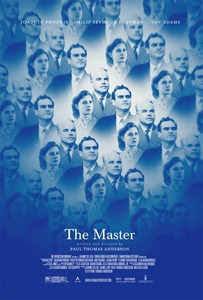
Movies
Reviews

Review: The Master
Filed under: Reviews
Paul Thomas Anderson's The Master is a fascinatingly intellectual film. But, not an emotional one. It washes over you like a tidal wave, knocking, flipping you upside down. Its visual beauty is unquestionable and the performances are brilliant but, his characters hold the audience at arms length. I was enthralled but, unlike literally every other film Anderson has made -- I was not emotionally engaged. That is not necessarily a failure of the picture. This can happen when hype and anticipation are involved. After all, this is a brand new P.T. Anderson movie.
Having seen the film, those preconceived notions of what The Master is -- based on trailers and marketing material -- are gone. All that is left is the most enigmatic and challenging film I've seen all year.
We follow Freddie Quell (Joaquin Phoenix), a soldier who descends into alcoholism upon returning home from the war. He clearly suffers from what we refer to today as 'Post Traumatic Stress syndrome'. He is an unhappy, sexually malnourished man, prone to fits of public masturbation, violence and social abrasiveness. One night after accidentally poisoning a migrant worker with some bizarre alcoholic concoction of paint thinner and God knows what else, Freddie runs off and finds himself stowing away aboard a ship, which just so happens to be in the use of one Lancaster Dodd (Philip Seymour Hoffman), a charismatic doctor/ writer and creator of The Cause, a pseudo-religion that bears similarities to L. Ron Hubbard's Scientology.
There is so much going on inside Lancaster Dodd's mind but, his face betrays very little. "You are a scoundrel," he tells Freddie at one point, an affectionate twinkle in his eyes. Quell is hired to whip up another batch of his homemade hooch and their friendship grows as he joins Dodd's burgeoning religion.
Freddie's first 'processing' sequence is one of the film's most hypnotic stretches. Dodd asks Freddie a series of questions, very much akin to the ones asked during Scientology's Auditing Sessions. "Are you thoughtless in your remarks? Is your behavior erratic? Do your past failures bother you? Is your life a struggle?" The performances of both men in this moment are thrilling and mesmerizing. Expect to see a clip from this scene on Oscar night.
Both Phoenix and Hoffman deserve recognition for their work but, the film's stand out performance comes from Amy Adams as Dodd's kind hearted but fiercely territorial wife, Peggy. At first she seems to adore Freddie for his inspirational effect on her husband. But quickly, she begins to see him as a corrosive influence. Freddie is always around (and drunk) when trouble rears its head. The tactic she uses on her husband is classic Scientology 'words-as-propaganda'. "I wonder how he got here and what he is after. Is it really so easy that he just came across us?" She is a calculating woman who understands the power of her sexuality. To the outside world, it might appear that Dodd is in charge but, Peggy sure as heck wears the pants in that marriage.
Later at a fancy soiree, Dodd demonstrates his process on an elderly female partygoer. But he finds himself interrupted by a pudgy cynic named John More (Christopher Evan Welch in a wonderfully tiny role). "Good science allows for more than one opinion, otherwise you merely have the will of one man -- which is the basis of a cult." He also questions Dodd's alleged claims to be able to cure some forms of cancer. Dodd nods his head, yes: "Even the smartest of our current scientists can be fooled." Implying that he -Lancaster Dodd- is smarter than even the smartest of current scientists. His arrogance knows no bounds. John More is simply saying: "Please, don't claim that you can cure cancer because-- you can't! You're gonna give false hope to a lot of sad, misguided people."
Mindful filmgoers have observed that Anderson has apparently done away with his vast dolly/ Steadicam/ tracking shots, deciding to keep the camera locked down this time around. I have a feeling this is less of an artistic choice than a technical requirement, as the film was shot in 70mm, a process that requires cameras vastly larger and less mobile than your normal 35mm ones.
Its coldness brings to mind the work of Stanley Kubrick. Many critics and bloggers have found the film to be confounding and impenetrable. And yet, I feel if this exact story had been told as a book -- as a novel, they would have gladly accepted everything that they found so unacceptable in the film. Although, admittedly-- The Master offers no easy answers.
Is Freddie Quell a better person for having met Lancaster Dodd? It is hard to say. Is he any wiser? That is even harder. Quell is a man of simple pleasures. All he really wants is acceptance -- friendship... to have a drink in his hand and a girl by his side (and in his bed). Yet, we must remember that his time spent with this cause is not abusive or negative. When he is with them, Freddie wears the finest clothes, drinks expensive booze that he definitely isn't paying for (although, neither is Dodd) and overall seems at his most content.
On the other hand, Lancaster Dodd is far more complex than that. He has dreams of his own, for his wife, his family and for his entire flock. He wanted to help Freddie because he believed his Cause was the answer. If not the answer, perhaps –at least- an answer. Dodd is no charlatan, unlike Eli Sunday (Paul Dano) from Anderson's previous pic There Will Be Blood. Dodd is a true believer and as he says: "...a hopelessly inquisitive man."
He wants to learn more and more, yearning for The Cause to evolve and change the same way a person does over the course of many years. (Dodd's second Dianetics-like book, The Split Saber is subtitled: "As a gift to Homo-Sapiens." Again, his arrogance.) But, with any kind of religion comes a required infallibility, which Dodd obviously cannot provide. This leads to his outbursts of explosive rage each time his view point is questioned. Dodd castigates Freddie for his animalistic drunkenness but, when Dodd snaps and starts screaming, he is always dead sober, a telling detail.
Is it so inconceivable that some lost soul (Phoenix) might find some actual solace in the teachings of Lancaster Dodd and use them to improve his life, without falling prey to the trillion year/ past lives/ crap? I mean-- You don't have to believe in Jesus Christ to agree with that whole 'Thou Shall Not Kill' thing, right?
Dodd believed he could help Freddie. But Freddie didn't want help. He just wanted a friend. But, in a relationship between a dog and his master, the word friend takes on a far different meaning. These two men will walk utterly different paths, despite (and perhaps, as a result of-- in Freddie's case) this momentary connection.
I love PT Anderson's The Master but, found myself finding that love some time after the film had ended. It is unquestionably a big, dark, glossy, dazzling work of art that requires thought and discussion afterwards. Paul Thomas Anderson is an immensely talented filmmaker who still continues to take bigger and bolder risks with each project. The Master is a film that stays with you for days after seeing it. Did I understand everything I saw? No but, that is a good thing.
If I understood everything, then by now, the mystery would have evaporated.
Follow Tony on Twitter.
Tags: The Master, Joaquin Phoenix, Philip Seymour Hoffman, Amy Adams, Jesse Plemons, Laura Dern, Christopher Evan Welch, Ambyr Childers, Rami Malek, W. Earl Brown
Related Posts
- Review: The Hunger Games: Mockingjay - Part 1
- Review: American Hustle
- Review: Man of Steel
- Tony's Top Ten: Best Films of 2012
- Breaking Bad: Buyout
Tony Hinds is a Canadian writer who studied film at the University of Winnipeg. In addition to ShowbizMonkeys.com, Tony has reviewed films for Step On Magazine and The Uniter. You can find Tony on Twitter.






Comments Posted (